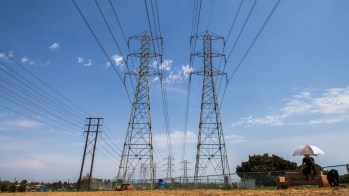
Venezuela’s power blackouts are fueling a surge in migration
Venezuela’s power blackouts are fueling a surge in migration

This story was produced by our colleagues at the BBC.
It’s late morning in the city of Barquisimeto, Venezuela. Like most days, the electricity is off and probably won’t come back for hours. This means no Wi-Fi, no fans, no elevators.
Yorma Arias runs a café in the city center called Coffee Kings. It’s not just the inconvenience; no electricity means no customers and no profits.
“We can’t use a lot of things: the coffee machine, the blenders,” she said. “People don’t come because they know there is no Wi-Fi, there is no air conditioning. It causes us anxiety. We don’t know when the electricity will come back. When it does, we don’t know what might be damaged.”
Venezuela has been in a state of economic, humanitarian and often political crisis for a decade. Power outages are caused by electrical faults but also by a state rationing of electricity — that’s because the country simply isn’t producing enough.
Jesus Armas is an engineer and a director for City Monitor, an organization that tracks public services across Venezuela. He blames most of it on poor infrastructure and maintenance.
“Almost all of the thermal electrical generation plants in Venezuela are out of service,” he said. “These power plants need a connection to a refinery to have access to natural gas. But the tubes needed to bring the gas to the power station have never been built.”
In a hospital a few hours away from Barquisimeto, beds are crammed together, mold sticks to the walls, and the power supply is intermittent. One student doctor, who asked not to be named, explained how medical staff manage until a backup generator kicks in.
“You see the surgeons take out their flashlights and continue the operation,” she told us. “You have to be alert and quick, very quick. At any moment the patient could die. I was in surgery for a caesarean and the electricity went for a whole five minutes. It’s like operating in a war.”
The noisy hum of the generator resonates through the hospital. It’s a fairly familiar sound in pharmacies, certain restaurants and some other businesses, but most people don’t have them in their homes. For those who have the luxury, generators are expensive. And with a minimum monthly wage of just $3.50, it’s very difficult to find the money to run them. Jesus Armas said that fuel is a problem too.
“The generator needs gasoline or needs diesel to work,” he said. “Many areas of Venezuela don’t have easy access to fossil fuels. All that most Venezuelans can do during a blackout is wait.”
For Luis Felipe, a freelancer who works remotely for a European AI company, it’s frustrating.
“I’m paid hourly, so the fewer hours I work, the less money I make,” he said. “If there is no power for six hours or even more, it’s practically a lost day. Sometimes I feel like I’m wasting my time in this country, because living in Venezuela is like being in survival mode.”
Back in Yorma’s café, her patience is running out.
“Every day the electricity goes I lose hope, I feel anxious,” she said. “I have a limit, and if the problem doesn’t get better or if it worsens, I’m going.”
Almost eight million people have left Venezuela since 2015. With many heading for the U.S., Yorma said it’s increasingly likely that he will join that number.
Controlling migration is one of the key themes of the U.S. election this year. In June, President Biden announced an executive order aimed at limiting the number of migrants who can request asylum at the Southern border. But with low wages and crumbling infrastructure forcing Venezuelans out of the country, many more may find themselves with nowhere else to go.
There’s a lot happening in the world. Through it all, Marketplace is here for you.
You rely on Marketplace to break down the world’s events and tell you how it affects you in a fact-based, approachable way. We rely on your financial support to keep making that possible.
Your donation today powers the independent journalism that you rely on. For just $5/month, you can help sustain Marketplace so we can keep reporting on the things that matter to you.

















